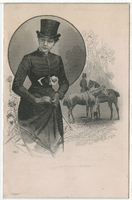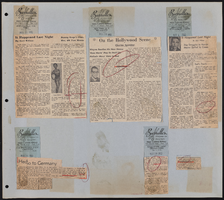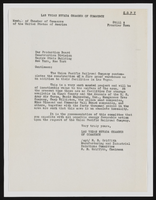Search the Special Collections and Archives Portal
Search Results
George Wallace oral history interview
Identifier
Abstract
Oral history interview with George Wallace conducted by Claytee D. White on April 10, 2009 for the All That Jazz Oral History Project. Wallace begins the interview by discussing his upbringing in Atlanta, Georgia, his extensive family, and attending college at the University of Akron in Akron, Ohio to study transportation. He describes having a career in advertising in New York City, New York before moving to Los Angeles, California, where he made the career transition into stand-up comedy. Wallace details his career as a successful comedian, writing for The Redd Foxx Show, going on tour with musicians such as Diana Ross and Tom Jones, and having his own running show in Las Vegas, Nevada. Other topics of discussion also include Wallace's friendship with fellow comedian Jerry Seinfeld, being awarded "Best Male Comedian" by the American Comedy Awards in 1995, and the changes Wallace has noticed in comedy and African American culture.
Archival Collection
Frederic Apcar oral history interview
Identifier
Abstract
Oral history interview with Frederic Apcar conducted by Nancy Hardy on July 19, 2003 for the Las Vegas Oral History Project. In this interview, Apcar describes his birth and early life in Paris, France, his parents' divorce, working from a young age, and, at the age of sixteen learning to dance ballet and tap. He talks about his first dancing job at the Folies Bergere in Paris, going on tour for several years with Josephine Baker, and on his return to Paris, dancing with the Lido before signing a contract for a three-month job at the Copacabana in New York City, New York. He then discusses his move to Las Vegas, Nevada in 1959, where he produced the Las Vegas Les Folies Bergere, Vive les Girls with Ron Lewis, and Casino de Paris. He also talks about Donn Arden as the other major show producer on the Strip during this period.
Archival Collection
Claude Trenier oral history interview
Identifier
Abstract
Oral history interview with Claude Trenier conducted by Claytee White on February 13, 1997 for the Women's Research Institute of Nevada (WRIN). Trenier discusses joining a band at the age of twenty two in 1941 and traveling around the country. Trenier describes working in Las Vegas, Nevada; Miami, Florida; and New York City, New York. Trenier also discusses the racism he saw as an African American performer, recalling that racial discrimination was especially fervent in Las Vegas. Trenier describes how many African American musicians and performers were allowed to perform in casinos, but not reside or lounge on the properties. Trenier also discusses the Moulin Rouge and his thoughts about its sudden closure in 1955. Finally, Trenier talks about his interactions with other entertainers at the time like Duke Ellington and Nat Cole King.
Archival Collection
Carolyn Freeman oral history interview
Identifier
Abstract
Oral history interview with Carolyn Freeman conducted on January 30, 2006 for the Boyer Early Las Vegas Oral History Project. Freeman begins by discussing her upbringing, her father, who was the president of the Japanese American Citizens League, and her early interest in dancing. She also details her experiences as a Japanese American during World War II and being relocated by the federal government. Freeman then describes how she began her career as a dancer after getting a role in a Broadway play in New York City, New York, and her later experiences dancing in productions in Reno, Nevada and San Francisco, California during the 1950s and 1960s. Lastly, Freeman discusses the differences between living in Las Vegas, Nevada compared to California and being offered the chance to dance in a Frank Sinatra show by himself and Sammy Davis Jr.
Archival Collection

The Orleans dinner menu
Date
Archival Collection
Description
Text

International Steward Association's meeting at Witzell's Point: photograph
Date
Archival Collection
Description
Image

Film strip of individuals or Hoover Dam construction, image 013: photographic print
Date
Archival Collection
Description
Image



